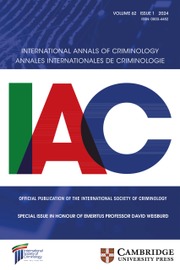Criminologists on Terrorism and Homeland Security
This volume presents 19 original essays addressing what is widely regarded as the most serious problem confronting America today and for years to come – terrorism – from the unique perspective of criminology. The chapters collected here address such issues as the prevention of terrorism, the applicability of community policing and routine activities models of crime to the problem of terrorism, how to balance liberty and security, and how to think about and manage the fear of terrorism, as well as the coordination of federal and local efforts to prevent and counter terrorism. Criminologists on Terrorism and Homeland Security will be of interest to anyone concerned about violence prevention in general and terrorism in particular, policing, prosecution, adjudication, sentencing and restorative justice.
- Original essays by some of the world's most respected criminologists
- Makes important contributions that will be of interest to policy makers and practitioners
- Thoroughly referenced, with a rich bibliography for each chapter
Reviews & endorsements
"Criminologists have long been interested in the processes of making laws, of breaking laws, and of reacting toward the breaking of laws. Yet, most of the time, the concern has been around street crimes, to a much lesser extent suite crimes, and to virtually no extent terrorist crimes. Fortunately, Forst, Greene, and Lynch have put together what I believe is the 'go-to' collection of original essays designed to describe terrorism, address the theoretical and policy issues surrounding it, and offer a sense of what sorts of data and questions need to be collected and asked in order for advancing theory and developing better public policy regarding terrorism. It is one thing to learn from such a set of readings, but another to be inspired by them. I have no doubt that reading this material will instill in readers the same sense of enthusiasm that is has generated for me." - Alex R. Piquero, Gordon P. Waldo Professor of Criminology, Florida State University
"This is an outstanding collection of essays on terrorism by some of our leading criminologists. The essays are consistently thoughtful and solidly based in the best evidence of their respective topics. This book is the starting point serious thinking, research, and policy making regarding terrorism." - Sam Walker, School of Criminal Justice, University of Nebraska at Omaha
"This collection of original chapters by some of the world’s leading crime specialists sheds new light on key questions regarding terrorism: how groups form, select their targets, and hone their craft before striking; and how democratic societies can respond effectively. The authors draw upon the lessons of research on the roots of crime and the development of youth gangs and criminal cartels, and what we know about the effectiveness of sophisticated policing and criminal investigation strategies, to paint a striking new portrait of the terrorism landscape. They add richness to our understanding of dynamics terrorism in the 21st Century, and present a nuanced view of the realities of preventing its consequences." - Wesley G. Skogan, Institute for Policy Research, Northwestern University
Product details
March 2011Adobe eBook Reader
9781139005715
0 pages
0kg
16 b/w illus. 5 tables
This ISBN is for an eBook version which is distributed on our behalf by a third party.
Table of Contents
- 1. Introduction and overview Brian Forst, Jack R. Greene and James P. Lynch
- Part I. Nature of the Problem:
- 2. Manifestations of aggression: terrorism, crime, and war David Klinger and Charles 'Sid' Heal
- 3. The etiology of terrorism: theory, data, and methods Quint Thurman and Wayman Mullins
- 4. An ecological perspective of terrorism Bryan Vila and Joanne Savage
- 5. Gangs and terrorist cells David Curry
- 6. Women, crime, and terrorism Rita Simon and Adrienne Tranel
- Part II. Strategies for Intervention:
- 7. Crime prevention strategies and terrorism Cynthia Lum and Christopher Koper
- 8. Routine activities theory and the prevention of terrorism James P. Lynch
- 9. Soldiers and spies, police and detectives Tomas Mijares and Jay Jamieson
- 10. Community policing and homeland security Jack R. Greene
- 11. Go analyze! (Connecting the dots) Jean-Paul Brodeur
- 12. Managing the fear of terrorism Brian Forst
- 13. Should profiling be used to prevent terrorism? A. Daktari Alexander
- 14. Federal and local coordination in homeland security Ed Maguire and William King
- 15. Liberty and security in an era of terrorism John Kleinig
- 16. Regulating terrorism John Braithwaite
- Part III. Thinking About Tomorrow:
- 17. Countering myths about terrorism: some lessons learned from the global terrorism database Gary LaFree
- 18. Criminal justice and terrorism: a research agenda Brian Forst.











